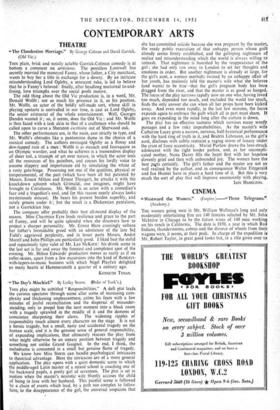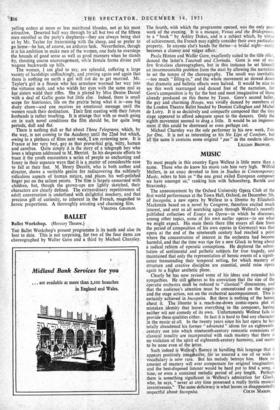CINEMA
"Westward the Women." (Empire.)---“ Three Telegrams.* (Academy.) THE women going west in Mr. William Wellman's long and only moderately entertaining film are 140 females selected by Mr. John McIntire in Chicago to be the future wives of 140 men working on his ranch in California, The date is 1850, a year in which Red Indians, thunderstorms, cobras and the divorce of wheels from their wagons were, it seems, at their peak. In charge of the expedition is Mr. Robert Taylor, in great good looks but, in a role given over to
yelling orders at more or less moribund blondes, not at his most attractive. Deserted half way through by all but two of the fifteen men enrolled as the party's shepherds—they are always being shot at by Mr. Taylor for fraternising with the sheep, and so prefer to go home—he has, of course, an arduous 'task. Nevertheless, though it is his ambition to make men of the women, one feels he oversteps the bounds of good sense as well as good manners when he stands by, shouting coarse encouragement, while female forms divine pull wagons backwards up hills.
The women, I am ,glad to say, are splendid, suffering a large variety of hardships unflinchingly, and proving again and again that there is nothing on earth a girl will not do to get married. Mr. Taylor's girl is a floosie who has somehow wormed her way into the virtuous mob, and who wields her eyes with the same zeal as her sisters wield their rifles. She is played by Miss Denise Darcel with a deal of Gallic gusto but little else. Indeed, there is small scope for histrionics, life on the prairie being what it is—one big dusty chore—and one receives no emotional message until the women reach their destination. Their first meeting with their future husbands is rather touching. It is strange that with so much going on in such novel conditions the film should be, for quite long periods, dull and flat. There is nothing dull or flat about Three Telegrams, which, by the way, is not coming to the Academy. until the 22nd but which, owing to a plethora of films next week, I am reviewing now. It is France at her very best, gay as that proverbial grig, witty, human and carefree. Quite simply it is the story of a telegraph boy who loses a telegram addressed to M. Herriot. In his desperate efforts to trace it the youth encounters a series of people so enchanting and - funny in their separate ways that it is a matter of considerable ease to fall at their feet. M. Henry Decal, who is both author and. director, shows a veritable genius for rediscovering the sublimely ridiculous aspects of human nature, and places his well-polished finger pat on the salient points. The film is largely concerned with children, but, though the grown-ups are lightly sketched, their characters are clearly defined. The extraordinary repetitiveness of adult conversation is underlined with delightful mockery, and that precious gift of curiosity, so inherent in the French, magnified to heroic proportions. A thoroughly amusing and charming film.
VIRGINIA GRAHAM.







































 Previous page
Previous page